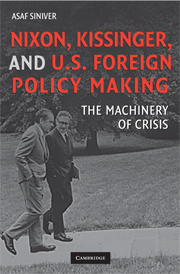Book contents
- Frontmatter
- Contents
- List of Figures
- Acknowledgments
- Abbreviations
- Dramatis Personae
- Nixon, Kissinger, and U.S. Foreign Policy Making
- Introduction
- 1 Structures, Processes, and Personalities in U.S. Foreign Policy
- 2 The Making of U.S. Foreign Policy During the Nixon-Kissinger Years
- 3 The Incursion into Cambodia, Spring 1970
- 4 The Jordanian Crisis, September 1970
- 5 The India-Pakistan War, December 1971
- 6 The Yom Kippur War, October 1973
- Conclusion
- Bibliography
- Index
- Plate section
- References
Introduction
Published online by Cambridge University Press: 17 August 2009
- Frontmatter
- Contents
- List of Figures
- Acknowledgments
- Abbreviations
- Dramatis Personae
- Nixon, Kissinger, and U.S. Foreign Policy Making
- Introduction
- 1 Structures, Processes, and Personalities in U.S. Foreign Policy
- 2 The Making of U.S. Foreign Policy During the Nixon-Kissinger Years
- 3 The Incursion into Cambodia, Spring 1970
- 4 The Jordanian Crisis, September 1970
- 5 The India-Pakistan War, December 1971
- 6 The Yom Kippur War, October 1973
- Conclusion
- Bibliography
- Index
- Plate section
- References
Summary
The statesman is therefore like one of the heroes in classical drama who has a vision of the future but who cannot transmit it directly to his fellow-men and who cannot validate its ‘truth’…It is for this reason that statesmen often share the fate of prophets, that they are without honor in their own country, that they always have a difficult task in legitimizing their programmes domestically, and their greatness is usually apparent only in retrospect when their intuition has become experience.
Henry Kissinger, 1964Henry Kissinger made this observation five years before being appointed Assistant to the President for National Security Affairs to President Richard Nixon, and nine years before becoming U.S. Secretary of State and arguably one of the most powerful men in world politics. One cannot help but admire his prophetic vision, as these words would eventually come to symbolise the legacy of U.S. foreign policy under the partnership of Richard Nixon and Henry Kissinger.
This book explores the making of American foreign policy during the Nixon years. More specifically, it is concerned with the mechanism of crisis decision-making during four major foreign policy crises between 1969 and 1974. To date, questions about the organisation of the foreign policy machinery and its impact on the making of foreign policy have been overshadowed by more descriptive accounts of the main achievements of the Nixon administration in foreign affairs.
- Type
- Chapter
- Information
- Nixon, Kissinger, and US Foreign Policy MakingThe Machinery of Crisis, pp. 1 - 11Publisher: Cambridge University PressPrint publication year: 2008



